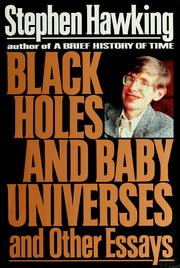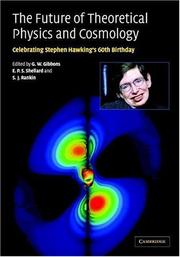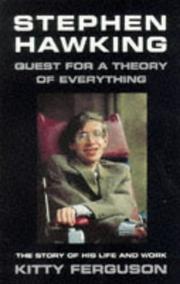| Listing 1 - 8 of 8 |
Sort by
|

ISBN: 0553095234 Year: 1993 Publisher: New York ; Toronto ; Auckland Bantam Books
Abstract | Keywords | Export | Availability | Bookmark
 Loading...
Loading...Choose an application
- Reference Manager
- EndNote
- RefWorks (Direct export to RefWorks)

ISBN: 0521820812 Year: 2004 Publisher: Cambridge : Cambridge university press,
Abstract | Keywords | Export | Availability | Bookmark
 Loading...
Loading...Choose an application
- Reference Manager
- EndNote
- RefWorks (Direct export to RefWorks)
Based on lectures given in honor of Stephen Hawking's 60th birthday, this book comprises contributions from the world's leading theoretical physicists. Popular lectures progress to a critical evaluation of more advanced subjects in modern cosmology and theoretical physics. Topics covered include the origin of the universe, warped spacetime, cosmological singularities, quantum gravity, black holes, string theory, quantum cosmology and inflation. The volume provides a fascinating overview of the variety of subjects to which Stephen Hawking has contributed.
Book
ISBN: 903510885X Year: 1990 Publisher: Amsterdam Bakker
Abstract | Keywords | Export | Availability | Bookmark
 Loading...
Loading...Choose an application
- Reference Manager
- EndNote
- RefWorks (Direct export to RefWorks)
Philosophy of nature --- Cosmology --- Hawking, Stephen William --- #gsdbf

ISBN: 0553405071 Year: 1992 Publisher: Toronto New York London Bantam Books
Abstract | Keywords | Export | Availability | Bookmark
 Loading...
Loading...Choose an application
- Reference Manager
- EndNote
- RefWorks (Direct export to RefWorks)
Astrofysica --- Astronomical physics --- Astronomische fysica --- Astrophysics --- Astrophysique --- Fysica [Astronomische ] --- Physics [Astronomical ] --- Physique astronomique --- Hawking, Stephen William --- Physicists --- Great Britain --- Biography
Book
ISBN: 0140156151 9780140156157 Year: 1992 Publisher: London : Penguin Books,
Abstract | Keywords | Export | Availability | Bookmark
 Loading...
Loading...Choose an application
- Reference Manager
- EndNote
- RefWorks (Direct export to RefWorks)
Hawking, Stephen, --- 5 <092> --- #WSCH:ETOS --- Wiskunde. Natuurwetenschappen--Biografieën --- 5 <092> Wiskunde. Natuurwetenschappen--Biografieën --- Hawking, Stephen --- Hawking, S. --- ホーキング, スティーヴン W. --- Hawking, Stephen W. --- Hawking, Stephen William
Book
ISBN: 9781911709084 9781911709091 9781473569065 1911709089 1911709097 Year: 2023 Publisher: TORVA
Abstract | Keywords | Export | Availability | Bookmark
 Loading...
Loading...Choose an application
- Reference Manager
- EndNote
- RefWorks (Direct export to RefWorks)
Stephen Hawking's closest collaborator offers the intellectual superstar's final thoughts on the universe. Perhaps the biggest question Stephen Hawking tried to answer in his extraordinary life was how the universe could have created conditions so perfectly hospitable to life. In order to solve this mystery, Hawking studied the big bang origin of the universe, but his early work ran into a crisis when the math predicted many big bangs producing a multiverse - countless different universes, most of which would be far too bizarre to harbour life. Holed up in the theoretical physics department at Cambridge, Stephen Hawking and his friend and collaborator Thomas Hertog worked on this problem for twenty years, developing a new theory of the cosmos that could account for the emergence of life. Peering into the extreme quantum physics of cosmic holograms and venturing far back in time, they were startled to find a deeper level of evolution in which the physical laws themselves transform and simplify until particles, forces, and even time itself fades away. This discovery led them to a revolutionary idea : the laws of physics are not set in stone but are born and co-evolve as the universe they govern takes shape. As Hawking's final days drew near, the two collaborators published their theory, which proposed a radical new Darwinian perspective on the origins of our universe. The book offers a striking new vision of the universe's birth that will profoundly transform the way we think about our place in the order of the cosmos and may ultimately prove to be Hawking's greatest legacy.
Cosmology. --- Big bang theory. --- Space and time. --- Relativity (Physics) --- Cosmologie. --- Big bang. --- Espace et temps. --- Relativité (physique) --- Hawking, Stephen, --- Universe. --- cosmology. --- Hawking, Stephen William, --- Relativité (physique)
Book
Abstract | Keywords | Export | Availability | Bookmark
 Loading...
Loading...Choose an application
- Reference Manager
- EndNote
- RefWorks (Direct export to RefWorks)
Astrofysica --- Astronomical physics --- Astronomische fysica --- Astrophysics --- Astrophysique --- Fysica [Astronomische ] --- Physics [Astronomical ] --- Physique astronomique --- Hawking, Stephen William --- Physicists --- Great Britain --- Biography --- Hawking, S. W. (Stephen W.) --- Astrophysics. --- Physicists - Great Britain - Biography.
Book
ISBN: 1280699671 9786613676658 0226522296 9780226522296 9780226522265 0226522261 9780226522289 0226522288 9781280699672 6613676659 Year: 2012 Publisher: Chicago The University of Chicago Press
Abstract | Keywords | Export | Availability | Bookmark
 Loading...
Loading...Choose an application
- Reference Manager
- EndNote
- RefWorks (Direct export to RefWorks)
These days, the idea of the cyborg is less the stuff of science fiction and more a reality, as we are all, in one way or another, constantly connected, extended, wired, and dispersed in and through technology. One wonders where the individual, the person, the human, and the body are-or, alternatively, where they stop. These are the kinds of questions Hélène Mialet explores in this fascinating volume, as she focuses on a man who is permanently attached to assemblages of machines, devices, and collectivities of people: Stephen Hawking. Drawing on an extensive and in-depth series of interviews with Hawking, his assistants and colleagues, physicists, engineers, writers, journalists, archivists, and artists, Mialet reconstructs the human, material, and machine-based networks that enable Hawking to live and work. She reveals how Hawking-who is often portrayed as the most singular, individual, rational, and bodiless of all-is in fact not only incorporated, materialized, and distributed in a complex nexus of machines and human beings like everyone else, but even more so. Each chapter focuses on a description of the functioning and coordination of different elements or media that create his presence, agency, identity, and competencies. Attentive to Hawking's daily activities, including his lecturing and scientific writing, Mialet's ethnographic analysis powerfully reassesses the notion of scientific genius and its associations with human singularity. This book will fascinate anyone interested in Stephen Hawking or an extraordinary life in science.
Communication in science. --- Mind and body. --- People with disabilities in science. --- Physicists --- Self-help devices for people with disabilities. --- Assistive technology --- Self-help devices for the disabled --- People with disabilities --- Physical scientists --- Handicapped in science --- Science --- Body and mind --- Body and soul (Philosophy) --- Human body --- Mind --- Mind-body connection --- Mind-body relations --- Mind-cure --- Somatopsychics --- Brain --- Dualism --- Philosophical anthropology --- Holistic medicine --- Mental healing --- Parousia (Philosophy) --- Phrenology --- Psychophysiology --- Self --- Communication in research --- Science communication --- Science information --- Scientific communications --- Psychological aspects --- Hawking, Stephen, --- Hawking, S. --- ホーキング, スティーヴン W. --- Hawking, Stephen W. --- Hawking, Stephen William --- Hawking, S. W. --- Hākkiṅ, Sṭīpan̲, --- Хокинг, Стивен, --- University of Cambridge
| Listing 1 - 8 of 8 |
Sort by
|

 Search
Search Feedback
Feedback About UniCat
About UniCat  Help
Help News
News